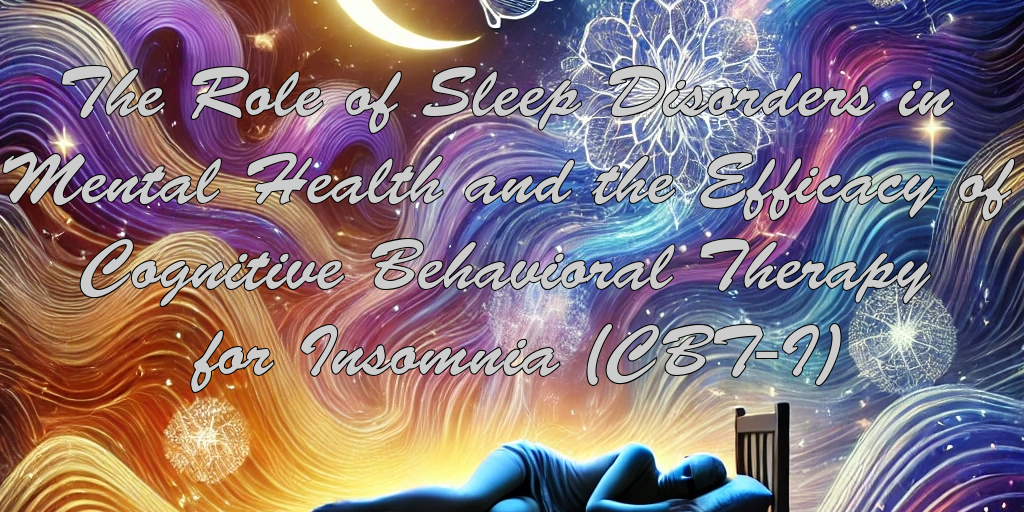Dr. Dilarom Demiralay
Journal of Consulting and Clinical Psychology – Publication Year: 2024 Volume and Issue: Volume 92, Issue 5
Abstract
Sleep disorders, particularly insomnia, significantly impact mental health, exacerbating conditions such as depression, anxiety, and post-traumatic stress disorder (PTSD). Recent advancements emphasize the bidirectional relationship between sleep disturbances and psychiatric disorders, where impaired sleep both contributes to and results from these conditions. This paper examines the role of sleep regulation in mental health and evaluates the efficacy of Cognitive Behavioral Therapy for Insomnia (CBT-I) as a first-line treatment. With its structured and evidence-based approach, CBT-I has shown substantial success in improving sleep quality and alleviating psychiatric symptoms. This study highlights CBT-I’s mechanisms, clinical applications, and future directions for integrative mental health care.
Keywords: Sleep Disorders, Insomnia, Mental Health, Cognitive Behavioral Therapy for Insomnia, CBT-I, Depression, Anxiety
1. Introduction
Sleep is a fundamental biological process essential for physical and mental health. Disruptions in sleep patterns—whether in duration, quality, or timing—are associated with a range of psychiatric disorders, including depression, anxiety, and PTSD (Baglioni et al., 2016). Among the various sleep disturbances, insomnia remains the most prevalent, characterized by persistent difficulty initiating, maintaining, or consolidating sleep, despite adequate sleep opportunity (Morin et al., 2006).
The bidirectional relationship between sleep disturbances and mental health is well-established: poor sleep exacerbates psychiatric symptoms, while psychiatric disorders further perpetuate insomnia (Harvey et al., 2011). This vicious cycle underscores the importance of sleep-focused interventions. Cognitive Behavioral Therapy for Insomnia (CBT-I) has emerged as the gold-standard, evidence-based treatment, offering a non-pharmacological approach to addressing insomnia and improving mental health outcomes.
2. The Role of Sleep Disorders in Mental Health
2.1 Sleep and Depression
Insomnia is a core symptom of depression, affecting up to 90% of individuals with major depressive disorder (MDD) (Riemann et al., 2015). Research indicates that sleep disturbances often precede the onset of depressive episodes, highlighting a causal link (Pigeon et al., 2008). Chronic insomnia perpetuates neurobiological dysregulation, including disruptions in the hypothalamic-pituitary-adrenal (HPA) axis and altered serotonergic activity, both of which are implicated in depression.
2.2 Sleep and Anxiety Disorders
Anxiety disorders, including generalized anxiety disorder (GAD) and panic disorder, are frequently accompanied by insomnia and hyperarousal (Cox & Olatunji, 2016). The cognitive rumination characteristic of anxiety prolongs sleep onset latency, while sleep deprivation exacerbates emotional dysregulation, further intensifying anxiety symptoms.
2.3 Sleep and Post-Traumatic Stress Disorder (PTSD)
In PTSD, nightmares and fragmented sleep are hallmark features (Germain, 2013). The disruption of REM sleep, critical for emotional processing, impairs the brain’s ability to integrate traumatic experiences, contributing to symptom persistence. Addressing sleep disturbances in PTSD has been shown to enhance overall treatment outcomes.
3. Cognitive Behavioral Therapy for Insomnia (CBT-I)
CBT-I is a structured, multi-component intervention targeting maladaptive thoughts and behaviors that perpetuate insomnia. It consists of the following core components:
- Sleep Restriction Therapy: Limits time spent in bed to improve sleep efficiency.
- Stimulus Control Therapy: Strengthens the association between bed and sleep by eliminating non-sleep activities in bed.
- Cognitive Restructuring: Identifies and reframes unhelpful beliefs about sleep.
- Sleep Hygiene Education: Promotes habits conducive to restorative sleep.
- Relaxation Techniques: Reduces physiological and cognitive arousal before sleep.
4. Clinical Efficacy of CBT-I
4.1 Insomnia Treatment Outcomes
Meta-analyses have consistently demonstrated the efficacy of CBT-I in reducing sleep onset latency, increasing total sleep time, and enhancing sleep quality (Trauer et al., 2015). Compared to pharmacological treatments, CBT-I produces sustained improvements with minimal side effects.
4.2 Impact on Psychiatric Symptoms
CBT-I not only improves sleep but also reduces symptoms of depression, anxiety, and PTSD. For instance, Manber et al. (2008) reported significant reductions in depressive symptoms among patients with comorbid insomnia and depression following CBT-I. Similarly, improvements in sleep continuity have been linked to reduced PTSD-related hyperarousal (Germain, 2013).
4.3 Long-Term Benefits
CBT-I’s effects persist long after treatment ends, with follow-up studies indicating sustained sleep improvements and reduced psychiatric symptoms over 6-12 months (Edinger & Carney, 2014).
5. Future Directions and Conclusion
While CBT-I has proven effective, future research should explore its integration with other therapies, such as trauma-focused cognitive behavioral therapy and mindfulness-based interventions. Additionally, advancements in technology, including digital CBT-I platforms, hold promise for increasing accessibility and scalability.
In conclusion, addressing sleep disturbances through CBT-I represents a critical pathway for improving mental health outcomes. By breaking the cycle between insomnia and psychiatric disorders, CBT-I offers a robust, non-pharmacological solution for enhancing sleep and overall well-being.
References
Baglioni, C., Battagliese, G., Feige, B., Spiegelhalder, K., Nissen, C., Voderholzer, U., … & Riemann, D. (2016). Insomnia as a predictor of depression: A meta-analytic evaluation of longitudinal epidemiological studies. Journal of Affective Disorders, 193, 10–19. https://doi.org/10.1016/j.jad.2015.12.015
Cox, R. C., & Olatunji, B. O. (2016). A systematic review of sleep disturbance in anxiety and related disorders. Journal of Anxiety Disorders, 37, 104–129. https://doi.org/10.1016/j.janxdis.2015.12.001
Edinger, J. D., & Carney, C. E. (2014). Overcoming insomnia: A cognitive-behavioral therapy approach. Oxford University Press.
Germain, A. (2013). Sleep disturbances as the hallmark of PTSD: Where are we now? American Journal of Psychiatry, 170(4), 372–382. https://doi.org/10.1176/appi.ajp.2012.12040432
Manber, R., Edinger, J. D., Gress, J. L., San Pedro-Salcedo, M. G., Kuo, T. F., & Kalista, T. (2008). Cognitive behavioral therapy for insomnia enhances depression outcome in patients with comorbid major depressive disorder and insomnia. Sleep, 31(4), 489–495. https://doi.org/10.1093/sleep/31.4.489
Morin, C. M., Bootzin, R. R., Buysse, D. J., Edinger, J. D., Espie, C. A., & Lichstein, K. L. (2006). Psychological and behavioral treatment of insomnia: Update of the recent evidence (1998–2004). Sleep, 29(11), 1398–1414. https://doi.org/10.1093/sleep/29.11.1398
Trauer, J. M., Qian, M. Y., Doyle, J. S., Rajaratnam, S. M., & Cunnington, D. (2015). Cognitive behavioral therapy for chronic insomnia: A meta-analysis. Annals of Internal Medicine, 163(3), 191–204. https://doi.org/10.7326/M14-2841
#SleepDisorders #Insomnia #MentalHealth #CognitiveBehavioralTherapyforInsomnia #CBT-I #Depression #Anxiety #dilarom #dilaromdemiralay #Dr.Dilarom






